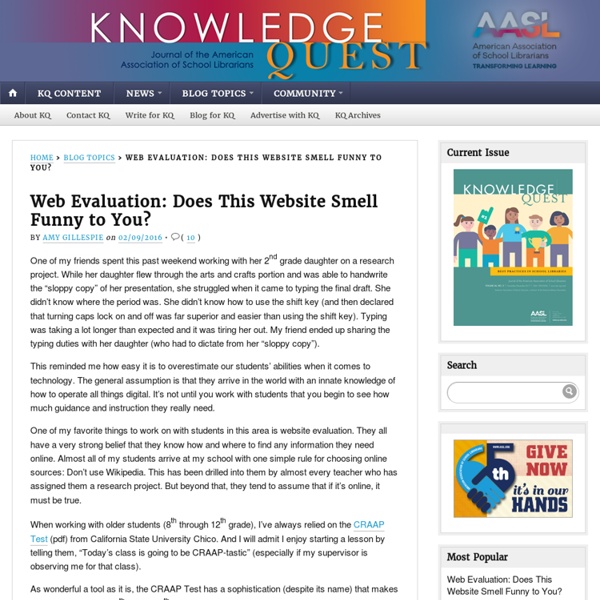Building a Culture of Collaboration®
In the wake of a contentious U.S. presidential election cycle, researchers and educators are shining a spotlight on critical “information literacy” skills. Determining authority, accuracy, and bias have long been essential aspects of analyzing content and sources of information. Today, this is no easy task for students (and adults as well) when authors of “information” do their best to deceive readers or hide their identity behind domains, such as .org, factual-seeming but phony statistical data, and authoritative-sounding language based on “pants of fire” lies. In her 2014 book, It’s Complicated: The Social Lives of Networked Teens, researcher danah boyd wrote, “becoming literate in a networked age requires hard work, regardless of age” (177).
Library Creates Genius Bookmark To Teach Students How To Spot Fake News
Though he's often wrong about his sources, President Trump is very right about one thing: there's a lot of fake news swirling around the internet these days. In fact, the problem has become so prevalent that many teachers are taking extra steps to ensure their students can tell which news is fake and which is real! For instance, Reddit user soldier4hire was at his local library when he noticed a unique bookmark.
'Fiction is outperforming reality': how YouTube's algorithm distorts truth
It was one of January’s most viral videos. Logan Paul, a YouTube celebrity, stumbles across a dead man hanging from a tree. The 22-year-old, who is in a Japanese forest famous as a suicide spot, is visibly shocked, then amused. “Dude, his hands are purple,” he says, before turning to his friends and giggling.
Teaching Information Literacy Now
Last week, a new study from Stanford University revealed that many students are inept at discerning fact from opinion when reading articles online. The report, combined with the spike in fake and misleading news during the 2016 election, has school librarians, including me, rethinking how we teach evaluation of online sources to our students. How can we educate our students to evaluate the information they find online when so many adults are sharing inaccurate articles on social media?
Critical Evaluation of Information Sources
Critical Evaluation of Information Sources Introduction | Evaluation Criteria | Further Reading | Acknowledgements True or false:Information that is published can be trusted because someone other than the author - an editor, a peer reviewer, a publisher, an institution - has reviewed it first. Most would probably agree with this statement, except perhaps when referring to the Internet.
To Test Your Fake News Judgment, Play This Game : NPR Ed
Fake news has been on Maggie Farley's mind further back than 2016 when President Trump brought the term into the vernacular. Farley, a veteran journalist, says we've had fake news forever and that "people have always been trying to manipulate information for their own ends," but she calls what we're seeing now "Fake news with a capital F." In other words, extreme in its ambition for financial gain or political power. "Before, the biggest concern was, 'Are people being confused by opinion; are people being tricked by spin?'
SchoolJournalism.org : News, Information and Media Literacy
The onset of the digital age forever changed the way readers interact with news and the way that journalists do journalism. Now that more data is produced in a single second that can possibly be consumed in a lifetime, the need for news literacy has never been more important. Simply put, news literacy is the ability to use critical thinking skills to judge the reliability and credibility of news reports and information sources.
Source Evaluation – Teen Services Underground
Right now, the national conversation about evaluating media for relevance, accuracy, and purpose is front and center, but librarians have always promoted choosing the best quality information whether it’s for personal learning or academic research. Upholding the values of our profession, I tried to teach source evaluation to students at my school in some of the ways I’d been shown in library school or learned from other librarians. I tried the CRAAP test, we rode the RAD CAB, and I made checklists for students to fill out for each source.
Renee Hobbs at the Media Education Lab
It’s a great headline, isn’t it? As director of Data & Society Research Institute and author of It’s Complicated, danah boyd has a conflicted relationship with the media literacy community as is revealed in her post, “Did Media Literacy Backfire?” Indeed, researchers have found that media literacy can backfire when it’s taught badly. And because the effective deployment of the pedagogy of media literacy requires substantial knowledge, skills and habits of mind, it’s not always done well, as researchers have found that when media literacy is taught badly, it can have unintended consequences. But danah boyd makes no such assertion about the need for media literacy to be taught well. In fact, the essay contains not a single reference to media literacy pedagogy or practice.



